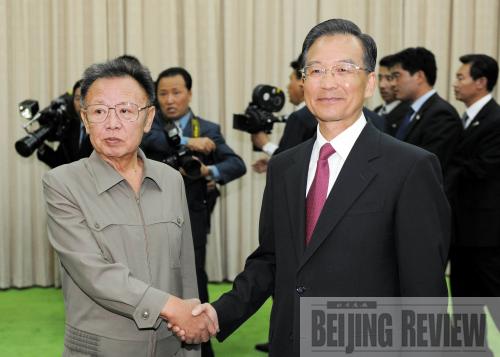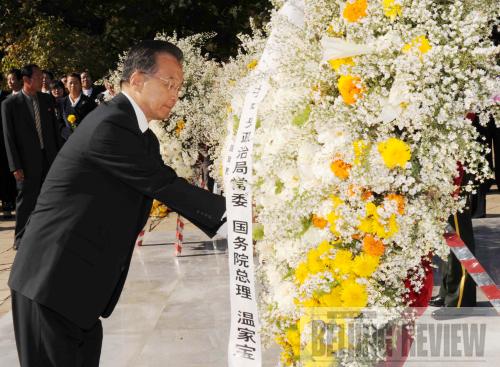|
 |
|
BILATERAL AND REGIONAL DISCUSSIONS: Chinese Premier Wen Jiabao meets with North Korean leader Kim Jong Il in Pyongyang on October 5 (FAN RUJUN) |
During his visit to North Korea on October 4-6, Chinese Premier Wen Jiabao not only charted the future course for the two countries' relations but also created opportunities to restart the discontinued six-party talks aimed at resolving the Korean Peninsula nuclear issue.
Chinese Foreign Minister Yang Jiechi, who accompanied Wen on his trip, said the premier's visit achieved two major results. "First, it deepened the traditional friendship between China and North Korea and boosted their good neighborly relations of cooperation," Yang noted. "Second, it helped push forward the denuclearization process of the Korean Peninsula."
While in Pyongyang, Wen met with several senior North Korean officials, including the country's top leader Kim Jong Il. He became the first Chinese premier to visit North Korea since 1991.
The two sides agreed to maintain high-level exchanges, deepen cooperation in economy and trade and strengthen coordination on major issues, Yang said. All this is aimed at advancing bilateral relations, delivering benefits to the Chinese and North Korean people and promoting regional peace, stability and development, he added.
 |
|
REMEMBERING THE PAST: Chinese Premier Wen Jiabao presents a wreath to the cemetery for martyrs of the Chinese People's Volunteers in Hoechang County some 100 km east of Pyongyang on October 5 during his visit to North Korea (HUANG JINGWEN) |
China and North Korea signed a series of cooperative agreements, including an intergovernmental agreement on economic and technological cooperation, during Wen's visit. They also announced plans to build a new highway bridge over the Yalujiang River to further link the two countries.
China is North Korea's main trade partner. Bilateral trade volume between the two countries totaled $2.793 billion in 2008, up 41.3 percent year on year, according to China's Ministry of Commerce. Of this total, China's exports to North Korea amounted to $2.032 billion, whereas its imports from North Korea stood at $760 million.
The two countries have designated this year, which also marks the 60th anniversary of their diplomatic relations, as the China-North Korea Friendship Year. North Korean Premier Kim Yong Il attended the opening ceremony of the Friendship Year in Beijing during his visit to China in March. Wen, for his part, participated in its closing ceremony in Pyongyang.
North Korea is among the first countries to establish diplomatic relations with the People's Republic of China. The two countries forged diplomatic relations on October 6, 1949, five days after the People's Republic was founded.
During his meeting with Kim Jong Il, Wen said it is in the interests of all parties concerned, including North Korea, to continue to pursue the goal of a nuclear-free Korean Peninsula and maintain peace and stability on the peninsula and in Northeast Asia.
To realize denuclearization on the Korean Peninsula through dialogue and consultation is a common understanding of the international community and the only way to solve the peninsula's nuclear issue, Wen said. The six-party talks are an effective mechanism to realize the abovementioned objectives, to which all the parties concerned should stay committed, he said.
Kim said North Korea's commitment to realizing the denuclearization of the Korean Peninsula remains unchanged. Through bilateral meetings between North Korea and the United States, the hostile relations between the two countries must turn into peaceful ones, he added.
North Korea is willing to attend multilateral talks, including the six-party talks, depending on the progress in the North Korea-U.S. talks, he said, according to a news release from China's Foreign Ministry.
North Korea, South Korea, the United States, China, Russia and Japan started the six-party talks in 2003 to address the security concerns as a result of the North Korean nuclear weapons program, with China chairing the talks.
Under an agreement reached in the talks, North Korea blew up the cooling tower at its Yongbyon nuclear complex in June 2008, marking a symbolic step forward toward denuclearization.
In April 2009, Pyongyang announced its withdrawal from the talks following the UN Security Council's unanimous decision to condemn its alleged satellite launch. The last round of talks was held in Beijing in December 2008.
The important consensus reached between Wen and Kim Jong Il on a nuclear-free Korean Peninsula is of great significance to resuming the six-party talks, said Wu Dawei, Vice Foreign Minister of China and head of the Chinese delegation to the six-party talks, in an interview with Xinhua News Agency on October 7.
"It suggested the talks faced important opportunities of getting out of their current difficulties," he said.
There are multiple forms of dialogue within the framework of the six-party talks, Wu said. The dialogue between North Korea and the United States could pave the way for the resumption of the six-party talks and is therefore an "important step" within the framework of the six-party talks, he said.
China supports bilateral talks between parties of the six-party talks and hopes the North Korea-U.S. dialogue achieves substantial progress, he added. | 